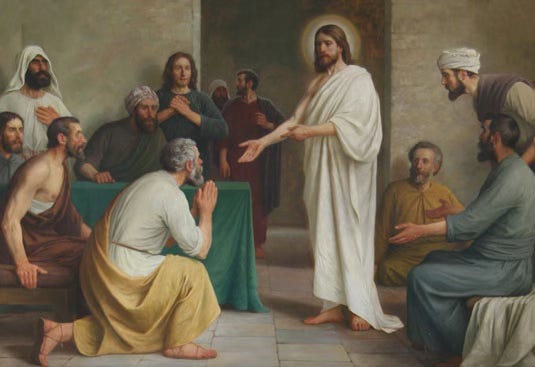Peace Be With You
The Beauty of an Orthodox Funeral
When a loved one recently passed away, I was reminded of how death was never supposed to be a part of humanity’s story. It is a symptom of the Fall of man.[1] Any time I witness death it feels so foreign to my human conscience that I become nihilistic and frustrated. And while I am confident in life after death in the Kingdom of Heaven, it is difficult to imagine. That, combined with the stark reality of my loved one simply ceasing to exist consumes all my attention and steals my peace. Which brings me to the beauty of an Orthodox funeral.
In Orthodoxy, funerals are melancholic and full of supplication. We affirm there is “no death, but a departure;” we petition God to “repose the soul of the departed, have mercy on her, and pardon her, and forgive her the multitude of her many sins and pass them by;” we pray that the Lord “opens unto her the gates of rest, that she may sing with all the angels, and become a partaker with all the saints.[2]”
The processional hymn during a Coptic Orthodox funeral in particular borrows the final words of the dying thief on the right hand of Jesus Christ, “Lord, remember me when You come into Your kingdom.”[3] It is chanted slowly and somberly. It is a beautiful hymn that I have come to detest. Every time I hear it someone I love is being buried.
Except this time was different. For 50 days following Easter Sunday, the Orthodox faithful chant a joyful hymn during funerals. Carrying the casket of my grandmother, I walked inside the long hallway of my childhood church hearing instead a hymn of triumph. A song of joy and power declaring how Christ trampled down death by His death and resurrected. Out of place, it seemed, yet perfectly conducive to the life after death I wanted her to live.
Then an Orthodox funeral begins with a directive by the priest. It is the same directive that opens nearly every single Orthodox prayer in every single Orthodox church. The priest crosses the faithful and says, “Peace be with all.” In many ways, it is offending. I am not at peace. Someone I love is dead and I will never see her again. And my emotions are a cascade of disparate thoughts: Annoyance – why was the cancer found so late? Guilt – I should have spent more time with her. Sorrow – my grandfather with dementia is now alone. Confusion – why would God allow that?
Yet amidst this flood of emotions, I recall these words are the very same words Jesus first spoke to his disciples after rising from the dead and appearing to them behind closed doors – twice.[4] “Peace be with you.”[5] And perhaps therein lies the beauty of an Orthodox funeral. The disciples witnessed death – a violent, publicized death of their leader, friend, and so they thought, God. A cascade of emotions likely also flooded through their minds. Regret – we were not with Him when He needed us most, even after He asked us multiple times.[6] Guilt – we forsook Him and fled, how could we?[7] Sorrow – He loved me so well and I denied him.[8] Fear – are the Jews who killed Him coming for us next?[9] It is amongst these men that Christ appears to them in a locked house and says simply, “Peace be with you.”
Thus, when I heard those words, a peace washed over me. Not a perfect peace, I was still distraught, but a greater peace than before. Peace that helped me conceptualize that my grandmother’s departure is God’s perfect timing and His ways are above my ways.[10] Peace that changed my pessimism into a confidence of a more peaceable life for my grandmother. Peace that focused my attention on the Lord of Peace.[11]
Upon seeing Christ appear in their midst, His disciples were terrified, confused, and overjoyed.[12][13][14] Jesus responds by again saying “Peace to you” and commissions them to spread the gospel.[15] With this gift of peace came the implication that His resurrection defeated death, thus changing everything then and today. The “old enmity” or the “middle wall of division” that separated heaven and earth shattered.[16] He then breathes on His disciples and consigns to them the Holy Spirit which gave them the confidence, leadership, and authority to spread this newfound revelation to the Jews and Gentiles alike.[17][18] Among those Gentiles were the Egyptians and the ancient ancestors of my grandparents. And they were gifted a church. An Orthodox church that gifts her faithful in their most distressing time the very same words that Jesus spoke. A command of Godly peace that settles the soul and puts my confidence in the One that conquered death.
[1] Genesis 2:16-17
[2] Funeral Exposition, Coptic Funeral for Women
[3] Luke 23:42
[4] John 20:26
[5] Luke 24:36
[6] Matthew 26:38; Matthew 26:40-41; Matthew 26:43-44
[7] Mark 14:50
[8] Luke 22:61-62
[9] John 20:19
[10] Isaish 55:8-9
[11] 2 Thessalonians 3:16
[12] Luke 24:37
[13] Luke 24:38-41
[14] John 20:20
[15] John 20:21
[16] Ephesians 2:14-18; also prayed by the Orthodox in the Prayer of Reconciliation from the Divine Liturgy of St. Gregory the Theologian.
[17] John 20:22
[18] John 20:23


